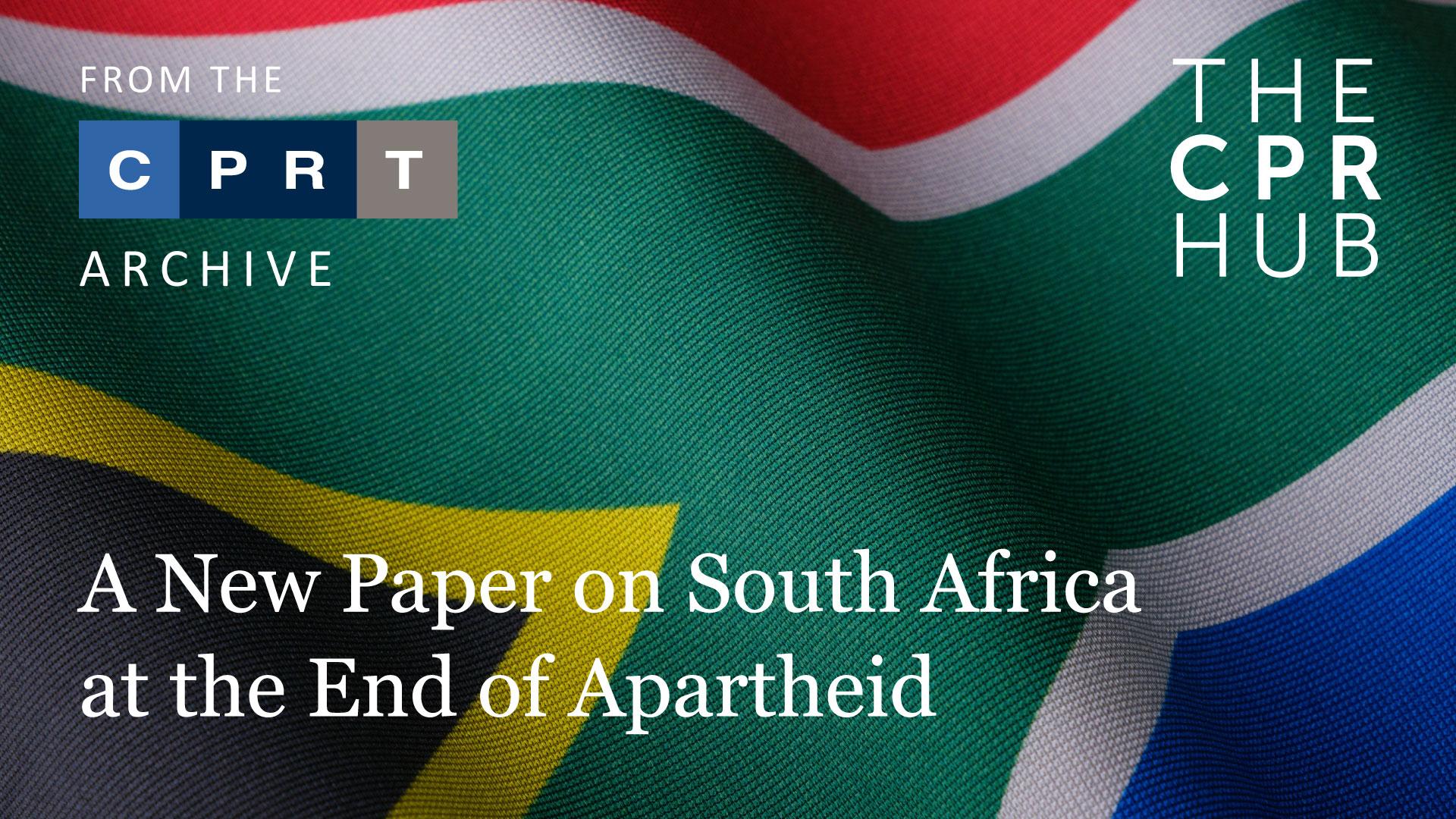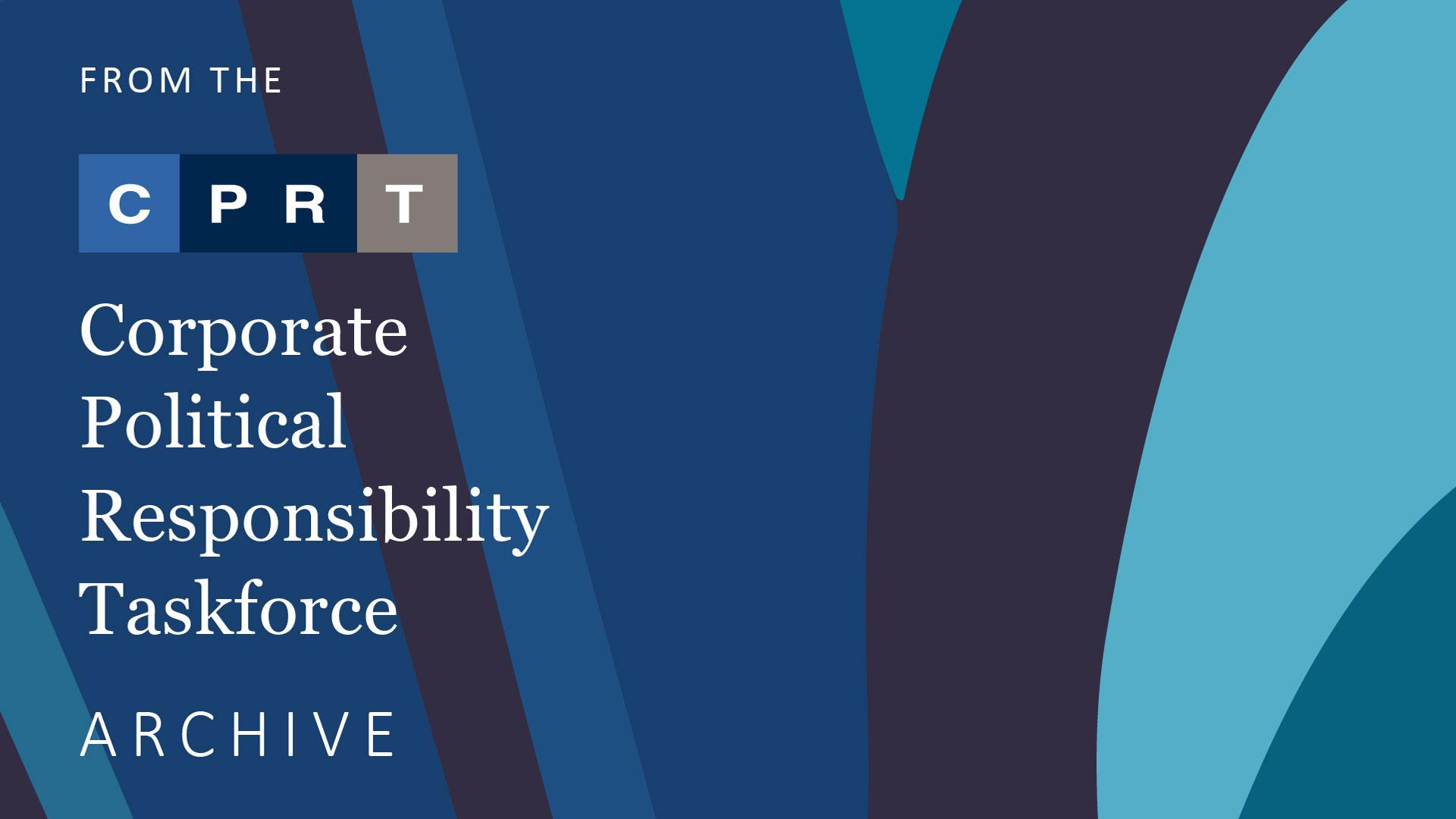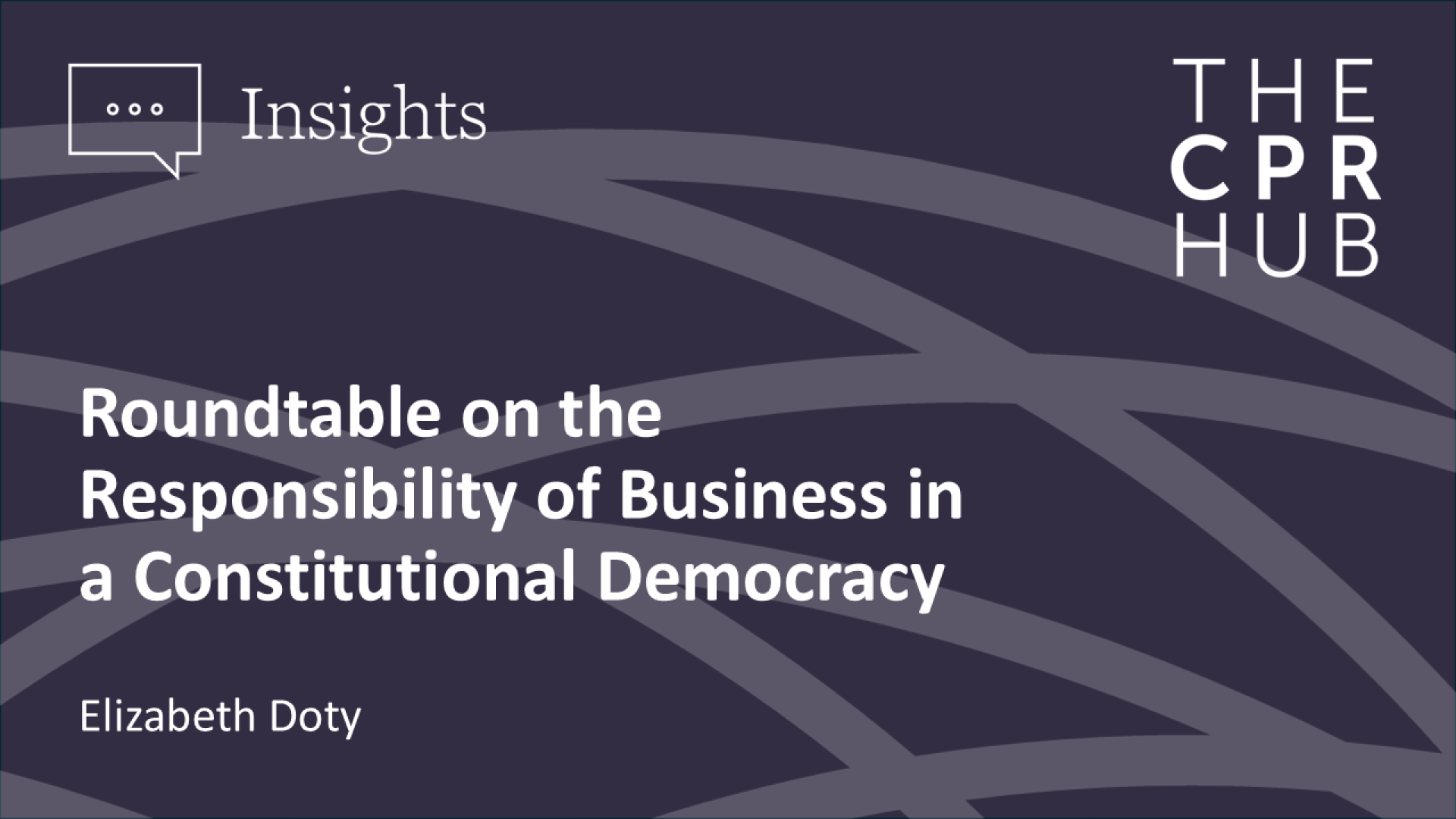Receive Updates from The CPR Hub
Learn about new tools, insights and events to help you consider how CPR can help your company, clients or members.











While this report more broadly assesses America’s competitiveness, Chapter 3: The Role of Business in Politics Today and Tomorrow, identifies the role of business in political gridlock, and suggests potential solutions. (See pg 28-36)
This policy brief outlines the challenges of AI implementation and dissemination through various sectors of society, and provides policy recommendations for how to protect privacy, safety and ethics as AI adoption grows.
With his background as a former business executive leading companies such as e-Scholastic, the Proactiv Company and Guthy-Renker, Seth Radwell provides both historical context for the political division in the U.S., and a detailed plan on steps we can take to depolarize society.
The updated B Lab certification standards include a new impact topic on “Government Affairs & Collective Action”, requiring companies to disclose and govern their political engagement, advocacy, lobbying practices and collective initiatives for systems change. The changes raise expectations for transparency and accountability in how firms use their influence and voice.
The updated B Lab certification standards include a new impact topic on “Government Affairs & Collective Action”, requiring companies to disclose and govern their political engagement, advocacy, lobbying practices and collective initiatives for systems change. The changes raise expectations for transparency and accountability in how firms use their influence and voice.
Philosopher David Silver argues that corporations are not merely profit-seeking entities but moral agents responsible for defending liberal democracy when authoritarian leaders pressure them to comply. Drawing on his book Corporations and Persons: A Theory of the Firm in Democratic Society, Silver contends that businesses must resist coercion, act collectively, and uphold ethical duties that sustain free markets and democratic institutions.
This Aspen Business & Society Summit report explores how business leaders can safeguard democracy as political risk rises. It argues that corporate silence or partisanship threatens both markets and legitimacy, urging principled, collective action and authentic corporate voice grounded in values, courage, and preparedness—core dimensions of Corporate Political Responsibility that sustain healthy civic and economic systems.
This book develops a theory of the corporation as a social and political actor within democratic society. It examines corporate personhood, legal rights, and the firm’s obligations to democratic norms, arguing that corporate power must be balanced by institutional safeguards to preserve accountability and legitimacy in political systems.
Paul Rosenburg interviews James Fishkin, the Janet M. Peck Chair in International Communication at Stanford University where he is Professor of Communication, Professor of Political Science (by courtesy) and Director of the Deliberative Democracy Lab. Fishkin recounts a wide range of real-world deliberation experiments—including on energy and climate—that achieved policy progress by integrating representative citizen groups, expert input, and structured facilitation. The interview outlines the design conditions for those breakthroughs, which can be a source of best practices for civil society organizations, and potentially, companies.
This large-scale study of the political psychology of American democracy explores how identity, belonging, trust, and “human flourishing” shape civic engagement and perceptions of democracy. Findings reveal polarization rooted in disconnection and call for democracy policies that strengthen belonging, civic learning, and local trust—paralleling CPR’s emphasis on legitimacy, accountability, and system stewardship for a resilient democracy.
This third edition of the Democracy Playbook offers evidence-based best practices for reversing democratic backsliding, to help citizens and stakeholders reclaim good governance, transparency, and the rule of law, and strengthen democratic resilience. It outlines how the business sector has historically supported these efforts by fighting corruption (Pillar 3) through actions like opposing state capture, supporting anti-corruption laws, and protecting whistleblowers, in addition to making democracy deliver (Pillar 7) through fair wages, labor rights, and investment in underserved communities. It calls on companies to continue this role, emphasizing that democratic stability is essential for reducing risk and sustaining long-term economic opportunity.
Majority Action’s white paper warns that unchecked AI development is driving climate damage, inequality, and democratic backsliding—non-diversifiable system-level risks that threaten portfolios and the economy alike. It urges long-term investors to adopt responsible AI guardrails that limit externalized harms, promote climate and labor equity, and preserve democratic stability. The report frames investor stewardship as a critical mechanism for AI accountability and system resilience.
This essay explores tensions between classical-liberal and national-conservative visions of markets and the common good. Drawing on Catholic social teaching and Wilhelm Röpke’s political economy, Salter argues that free enterprise and moral order must be treated as complements, not substitutes. He calls for dispersed property, subsidiarity, and policies that support economic independence, civic virtue, and human flourishing.
Related Topics to Check Out
Free Enterprise Competitive Markets (A) – Central theme: explores how markets serve the common good when balanced by moral and civic considerations rather than pure efficiency.
Healthy, Stable Systems (A) – Advocates dispersed property and subsidiarity to sustain freedom and prevent concentration of power—key CPR system-stability goals.
Corporate Citizenship (B) – Frames enterprise as a moral actor embedded in community life, with duties to uphold shared well-being beyond profit.
Responsibility (B) – Highlights the moral obligations of firms and policymakers to design markets that sustain families, workers, and civic order.
This initiative explores how clear, stable legal systems support freedom, innovation, and economic growth—laying the groundwork for healthy markets and democratic institutions.
This paper provides a deep and detailed examination of how economies and businesses fare under leaders who purport to be both pro-business and populist. With the increase in the number of populist leaders throughout the world, this question has become increasingly pressing.
Anthropic announces a National Security and Public Sector Advisory Council composed of experts in defense, intelligence, government administration, and technology ethics. The council will advise on responsible AI deployment, risk mitigation, interagency coordination, and safeguarding democratic and security institutions amid rapid AI advancement. It reflects rising expectations for accountable AI governance in public-impact domains.
This series offers a retrospective on how rising political spending—especially via dark money and super PACs—is shaping public perceptions, fueling polarization, and undermining trust. It highlights record-breaking ad spending across TV and digital platforms and calls for stronger disclosure and enforcement to protect democratic integrity.
A Yale School of Management survey of CEOs reveals widespread private concern that Trump administration policies—from tariffs to monetary and health regulation—are harming business interests and may violate the law. Yet most executives remain publicly silent, fearing retaliation. The episode underscores corporate vulnerability to political retribution and the importance of principled, transparent corporate voice in safeguarding democratic norms and market stability.
This guide offers conversation practices and norms that help people move beyond political echo chambers, enabling genuine learning, mutual understanding, and connection across divides.
This academic article analyzes how political polarization affects corporate nonmarket strategies—such as lobbying, advocacy, and coalition-building—across different stages of the policy life cycle. It shows how polarization changes the risks and payoffs of engagement, complicating firms’ ability to influence policy without triggering backlash or strategic misalignment.
This study examines the global trend toward populism from 1900 to 2020 and its long-term economic impact. It finds that countries under populist leadership experience a 10% lower GDP per capita after 15 years compared to a plausible non-populist counterfactual, linking populist governance to economic instability, weakened institutions, and heightened risks for businesses and investors.
Patricia McLagan is an author, consultant, and business owner with fifty years’ experience supporting large scale change processes in business and governments globally. From 1983 through 2004, Pat consulted with major South African businesses, government entities, universities, and parastatals, and chaired the Desmond Tutu Peace Foundation after returning to the US. This article draws on her personal experience with South African businesses and government entities from 1983 into the 2010s, focusing on what some white South African business leaders did in a time of polarization and potential civil war.
This work examines how global capitalism’s democratic foundations are eroding, as inequality, institutional decay, policy capture and corporate dominance erode democratic legitimacy. It argues that corporate-state relations and market structures shape democratic outcomes and that without attention to power, voice and influence, business risks operating in unstable systems of diminishing legitimacy.
The Grand Bargain Project finds that Americans across party lines identify the same six priorities—economic opportunity, education, healthcare, national debt, clean energy, and tax reform—as critical, with surveys showing over 90% agreement on their importance. Even more encouraging, when comparing the status quo to a shared package of 35 reforms, 77% preferred the reforms. These results point to rare cross-partisan convergence on both the problems and potential solutions, and a possible place for constructive engagement.
Mancur Olson’s classic work explains why individuals often fail to organize effectively around shared interests, even when collective action would benefit all. His “free rider” problem and distinction between small and large groups reshape understanding of labor unions, corporations, and political coalitions. Olson’s framework underlies modern theories of governance, lobbying, and institutional design—key foundations for Corporate Political Responsibility.
Data analysis shows that voters labeled as moderates, independents, or undecided hold diverse and often conflicting views, undermining the idea of a unified “moderate middle” in today’s polarized political landscape.
Interviews with 48 Americans from across ideological and demographic groups reveal broad commonality in wanting fairness and clear expectations of government—such as equal rule enforcement, responsive leadership, transparent decision-making, and dignified public services. At the same time, people diverge on what constitutes fairness, with some emphasizing opportunity, others consistent process, and others tangible outcomes that prove fairness is real. Provides a starting point for stakeholder engagement, and suggests approaches that speak to concerns across the political spectrum.
Explores how citizens' assemblies—randomly selected groups with active facilitation deliberating on policy—could improve U.S. democratic decision-making, improve trust and reduce polarization. Shares a successful initiative in Oregon to address youth homelessness.
This article reexamines Milton Friedman’s shareholder primacy argument, suggesting that stakeholder capitalism can incorporate market discipline and accountability principles without abandoning broader societal obligations. It argues that profit-seeking must operate within competitive markets and legal frameworks that preserve democratic legitimacy and prevent capture.
Learn about new tools, insights and events to help you consider how CPR can help your company, clients or members.
